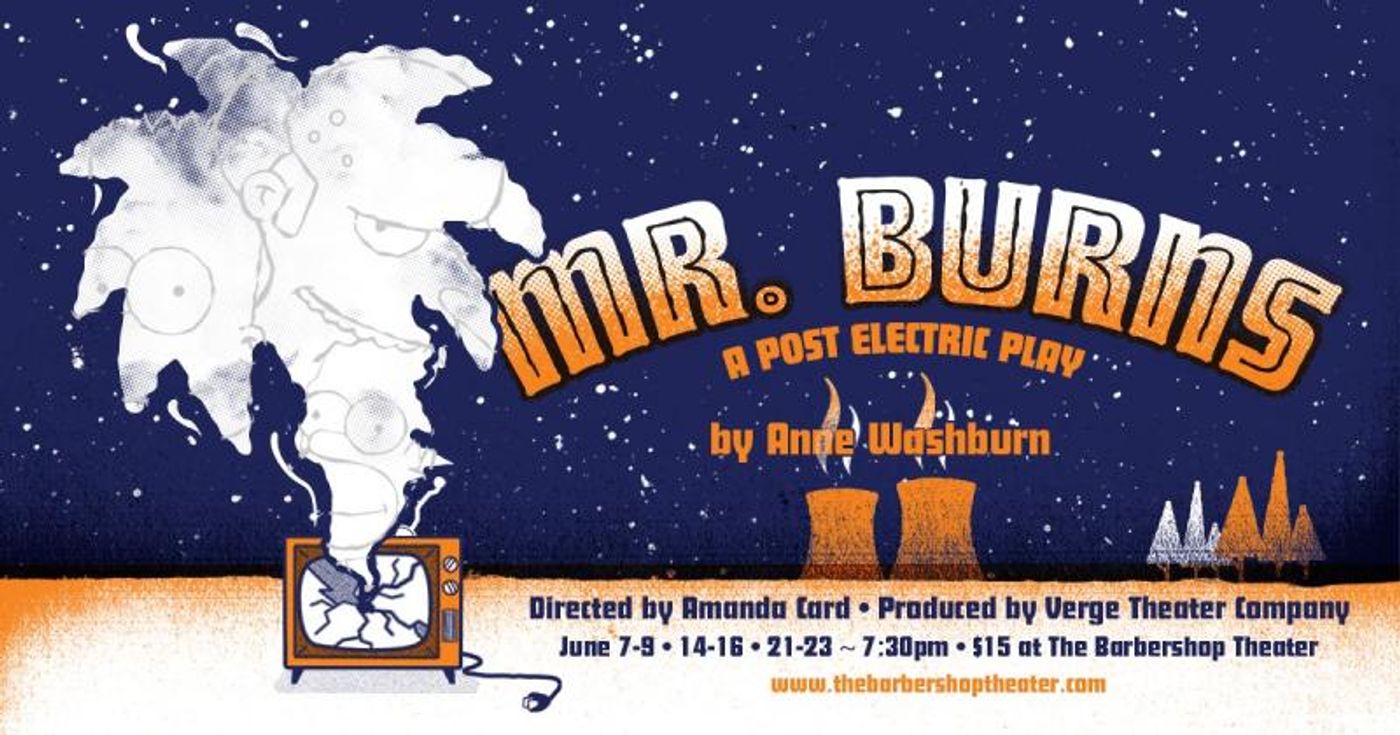Review: Verge Theater Scores Another Hit With Post-Apocalyptic MR. BURNS...

Over coffee, on the morning after seeing Verge Theater Company's production of Mr. Burns, A Post-Electric Play - the dark comedy by Anne Washburn, directed by Nashville theater veteran Amanda Card - last weekend, a friend allowed as how he had heard of the play, but had no idea what it was about, asking me for a brief synopsis: "It's about a group of five people in a post-apocalyptic society, presumably brought about by nuclear events across the country, if not the world, who entertain one another with detailed stories based upon episodes from The Simpson," I answered.
"So, it's essentially the story of your life?" he queried, alluding to the fact that I am, indeed, a longtime fan of the animated series on Fox, the tale of an atypical American family in fictional Springfield, comprised of Homer, Marge, Lisa, Maggie and the irascible Bart. The particular episode which provides the focus for Mr. Burns is "Cape Feare," based upon the 1991 film Cape Fear (which itself was a remake of an earlier movie from 1962) , in which the dastardly Sideshow Bob is released from prison, vows to end Bart's life and is given his ultimate comeuppance when Bart cleverly suggests he perform the entire score from Gilbert and Sullivan's The Mikado. Bart's ingenious plan - he foils Sideshow Bob's Machiavellian plot with ease - is filled with the customary pop culture references that have made The Simpsons a beloved television hit for 30 years.
With well over 600 episodes to its credit, it makes perfect sense that The Simpsons would provide creative fodder for other genres outside the animated realm and Washburn's play is one of the best, to be sure, and whether you're a fan of the series or even if you know nothing much about them besides the fact that Bart's a rapscallion, Lisa is a know-it-all, Marge has blue hair and Homer loves donuts, you won't be lost throughout the three acts of Mr. Burns... (named after the head of the Springfield Nuclear Power Plant where Homer works).
Act One of Washburn's wonderfully dark comedy focuses on the group of survivors in the aftermath of the recent apocalyptic event and audience members must discern what's transpired prior to the start of the play from various parts of conversation which allude - sometimes directly, oftentimes obliquely - to the cataclysm that has brought them to where they are at the beginning of the play. Card deftly blends a taut sense of mystery that envelops the play with a delightful sense of whimsy that informs the surreal and off-kilter humor so closely associated with The Simpsons itself, ensuring that her nine-member cast deliver an authentic, if wacky, reading of Washburn's whip-smart script.
In Act Two, our original group of survivors have gained a couple new members and we learn that they now travel around, performing episodes from The Simpsons - complete with spot-on commercials - for other survivors. In fact, we learn that other survivors have established what amount to a traveling circuit to perform scenes from various long-running tv shows in a world where entertainment is still appreciated even if it's stuff you know by heart.
Some 75 years later, in the play's third act, we are treated to an opera based on The Simpsons, in which Mr. Burns is even more evil than he is originally portrayed on the series, while Bart and company may have finally met their match. The whole enterprise (speaking of which, you know there must be survivors out there mining the whole Star Trek universe for material) is engaging and intriguing and Washburn's most impressive achievement may actually be the fact that she compels her audiences to think about the impact of such cataclysmic events upon their own lives.
In a world of entertainment, where post-apocalyptic societies provide so many possibilities for fictional treatment (this summer alone, I've binged The Society, The Passage and The Rain), it just makes sense that our favorite denizens of Springfield would be updated in such mesmerizing fashion.
Card directs a fresh-faced cast of talented young performers in the piece - of her nine-person ensemble, we recognized only three actors (which in itself is something of a miracle and helped to provide a more interesting basis for the two-and-a-half-hour comedy) - and the actions continues at a brisk pace throughout, with the surprises keeping you on the edge of your seat, waiting in eager anticipation for more. Donovan Hughes, Sophia Sutton, Alyssa Borg, Althea Baldwin, Kit Bulla, Heather LeRoy, Elena Spradlin, Jimmy Buck and Joe Mobley are uniformly impressive in their roles and they command your attention with complete dexterity and awesome wit.
Performed amid the intimate confines of The Barbershop Theatre, the in-your-face attributes of Washburn's comedy are brought even closer to the audience, making for an immersive night of theater quite unlike anything you've seen before. Daniel DeVault's lighting design, which is easily the best work we've ever seen from him, is sheer perfection - but that's all you'll get from me; rather, you need to go see the show yourself, where you'll also be treated to Madeleine Hicks' props, sets and "cardboard inspirations" and Margaret Horne's swell masks.
Plus, there's music - kudos to Shawn Knight for his musical direction - which includes Kit Bulla's memorable performance of "Three Little Maids From School Are We" and nifty costumes by Colleen Garatoni that are ideal for the time, place and events of Mr. Burns, A Post-Electric Play.
Mr. Burns, A Post-Electric Play. By Anne Washburn. Score by Michael Friedman. Lyrics by Anne Washburn. Directed by Amanda Card. Musical Direction by Shawn Knight. Presented by Verge Theater Company at The Barbershop Theater, 4003 Indiana Avenue, Nashville. Through June 23. For more information, go to www.thebarshoptheater.com. Running time: 2 hours, 30 minutes (with two 15-minute intermissions).
Reader Reviews
Videos

